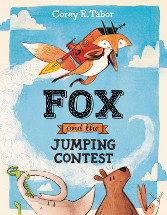Fox and the jumping contest by Corey R. Tabor

Balzer and Bray, 2016. ISBN 9780062398741
The animals are having a jumping contest - Elephant, Bear, Rabbit,
Turtle, Frog and Fox have all entered - and Fox is determined he
will win. He even imagines how good the trophy will look perched on
his mantlepiece.
But Fox isn't particularly good at jumping so he figures if that
trophy is going to have pride of place in his loungeroom he will
need a bit of assistance. So while the other animals practise, he
schemes and plans and builds. His solution? A jetpack that he paints
to match his fur hoping the other animals won't notice - so it is
clear that he knows he is cheating.
On the day of the contest with the bird judges all ready and perched
high in the branches the animals show their talents. Frog does well
and gets extra points for style; Turtle doesn't do as well and
Elephant less so. Bear was loud and Rabbit was spectacular. And then
it was Fox's turn . . .
This is a story with a twist, and it's a twist that can spark some
great discussion points which are perfect for getting young children
to start to think critically, to philosophise and to empathise. Fox
with his jetpack strapped to his back disappears so high in the sky
that the judges can't wait for him to return so they begin the
awards ceremony. But just as Rabbit is about to receive the trophy,
Fox falls back to Earth and plops into it and takes first place. The
final scene shows Fox standing back admiring the cup on his
mantlepiece, right where he had envisioned it would be.
But does Fox deserve it? Has he cheated? Were there written rules
about external assistance or were they just assumed? Why do we have
rules? How do the other animals feel about the win? What about
rabbit? Has there been fair play and sportsmanship? What is the
twist in that final scene and was it a reasonable way to solve the
problem? What does 'compromise' mean?
Careful exploration of the text, verbal and visual, offers a lot of
depth to this story and it deserves re-reading to get the most from
it. For example, Elephant doesn't mind that she cannot jump well
because she is "good at other things" and that in itself could
provoke another discussion about how we all have our strengths so
comparisons are not always fair. Even very young children have a
strong sense of justice and with the pictures enriching the words so
well with their extra detail and action there is much to examine and
ponder.
Life and literature are full of characters who are determined to win
regardless and this is a surprisingly good story that can introduce
even very young children to contemplate, at their own level, the
philosophical question of does the end justify the means and giving
them an opportunity to start thinking on a more abstract level, from
different perspectives and consider what is not being said.
One to get brains moving . . .
Barbara Braxton